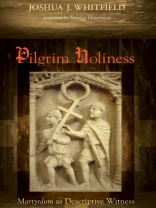As an explicitly christological witness, martyrdom offers a limited but vital description of the present within the various and unpredictable arenas of living, suffering, and dying. That is to say, martyrdom is not the tragic conclusion of some fatal ideological conflict but a momentary truthful glimpse of present circumstances. Martyrdom reveals, clarifies, and illumines what we take for the real. Martyrs are therefore significant for the church today because they exhibit the sort of truthful living that refuses the claims of history and power without Christ; they show the sort of living and dying that returns forgiveness upon murder, and patience beyond domination. Meditating primarily on the second-century martyrdoms in Lyons and Vienne, France, Pilgrim Holiness offers a view of Christian martyrdom that challenges prevalent misunderstandings about what martyrs are doing in sacrificing their lives. Joshua J. Whitfield argues that martyrdom is a moment of truthful disclosure and thus a moment of forgiveness and peace–gifts for which we are in desperate need.
Sobre o autor
Stanley Hauerwas is professor emeritus of ethics at Duke University where he held the Gilbert T. Rowe chair for more than twenty years. Among his numerous publications are Sanctify Them in the Truth: Holiness Exemplified (1998) and Living Gently in a Violent World, with Jean Vanier (2008). His latest publication is Fully Alive: The Apocalyptic Humanism of Karl Barth (University of Virginia Press, 2023).







![Capa do Brian Schrag & Julisa Rowe: Community Arts for God's Purposes [Chinese] 貼近神心意的社群藝術 Capa do Brian Schrag & Julisa Rowe: Community Arts for God's Purposes [Chinese] 貼近神心意的社群藝術](https://static.worldofdigitals.com/thumb_webp/740/9781645083740.webp)




